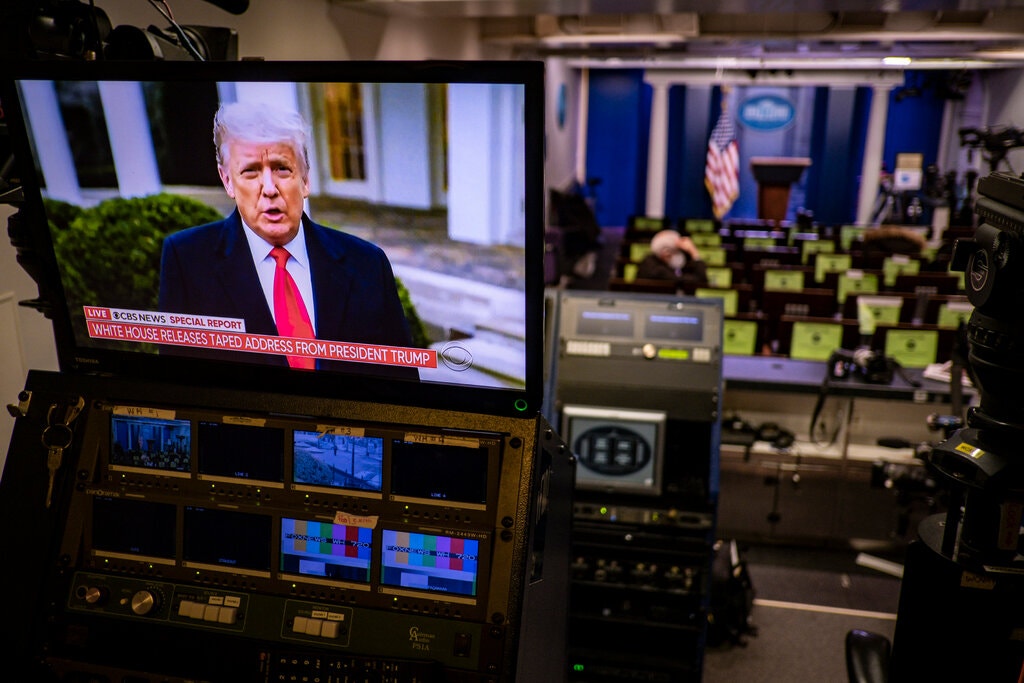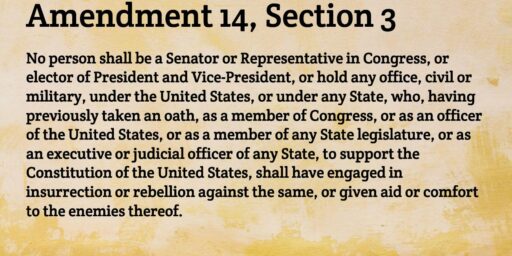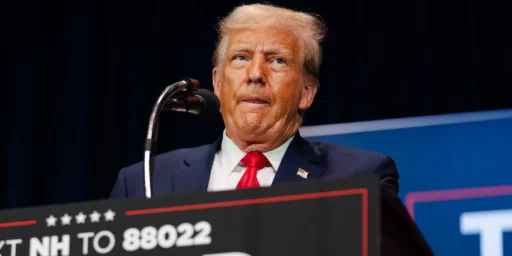The Disqualification Clause and January 6
A provision of the 14th Amendment to keep Civil War generals out of office is back in play.

At NYT, Blake Hounshell and Leah Askarinam explain “How Jan. 6 Gave the 14th Amendment New Life.” And by the Amendment, they mean an obscure, arguably vestigial, section of it.
An obscure 19th-century provision of the U.S. Constitution that barred members of the Confederacy from holding political office is back in the national conversation — and some are hoping it can keep Donald J. Trump and his allies off the ballot.
After the Civil War, Congress sought to remake the politics of the states they had just defeated on the battlefield. Fearing that the grandees of the Old South would slink back to power, they crafted Section 3 of the 14th Amendment, known as the Disqualification Clause.
The provision applied to anyone who had previously taken an oath to support the Constitution and then either “engaged in insurrection or rebellion” against the United States or gave “aid or comfort to the enemies thereof.”
The clause, tucked into an amendment better known for extending citizenship to African Americans, was largely an object of academic curiosity until last week. That’s when lawyers representing a group of North Carolina voters filed a novel legal challenge seeking to keep Representative Madison Cawthorn off the ballot this year.
Cawthorn is a close ally of Mark Meadows, Trump’s former chief of staff, and has made comments suggesting he supported the Jan. 6 riot at the Capitol. The complaint alleged that his actions trigger the Disqualification Clause, making him ineligible to serve in Congress.
Many have argued in passing that this provision can be used not only against the January 6 rioters and plotters by against its supporters and enablers, including goodly number of Republican politicians up to and including former President Trump. I’m highly skeptical.
As the litigation makes its way through the court system, it could also help clear up a few broader questions:
• Was Jan. 6 an “insurrection,” legally speaking?
• What does it mean to be “engaged” in insurrection, and what level of involvement triggers the Disqualification Clause?
• Does Congress need to pass a law or resolution to activate it?
“Most people, me included, think it was an insurrection, but neither Congress nor the courts have made that official determination,” said Mark Graber, a legal historian at the University of Maryland.
Laurence Tribe, an influential law professor at Harvard University, has held private conversations with several members of Congress on the topic as they puzzle through how statutes written in the 1860s might apply in an entirely new context. And while Tribe’s view is that Jan. 6 was indeed an insurrection, it is by no means obvious how courts will interpret the 14th Amendment without clearer signals from Congress.
“You’re dealing with a very murky and open area of constitutional law,” Tribe said in an interview.
Even one of the foremost experts on the Disqualification Clause, Gerard Magliocca of Indiana University, called it “vestigial” in a well-timed paper on the subject published in 2020 three weeks before Jan. 6. He has since become an advocate for applying it to disqualify Trump from running for president in 2024.
Given the obvious historical context of the Amendment, it seems clear to me that the provision was intended to apply to belligerents in the Civil War, period. (And, it’s noteworthy that most were given amnesty under President Grant less than four years after ratification.) But a textualist interpretation could certainly take it beyond that since, ultimately, the Constitution means whatever 5 Justices on the Supreme Court says it does at any instant. It really hasn’t been tested:
In fact, it’s been used precisely once since the Reconstruction era — in the 1919 case of Victor L. Berger, a socialist from Wisconsin who was removed from Congress after being accused of harboring pro-German sympathies. Berger was later reinstated when the Supreme Court tossed out his conviction for espionage, on the grounds that the judge harbored an anti-German bias.
Regardless—and I’m a political scientist, not a lawyer—it would seem to be plainly unconstitutional for Congress to declare the 1/6 event an insurrection* and for punishment to ensue from that declaration. It would seem rather obviously both an ex post facto law and a bill of attainder. The Congressional Research Service concurs.
So that leaves the courts. And, while I’m torn as to whether 1/6 constituted an insurrection as defined in the various political science conflict literature, it seems clear not to meet the legal standard in the US Code. It’s why most of the 1/6 rioters have been charged with misdemeanors or rather minor felonies, not insurrection. Thus far, only a handful of Oath Keeper plotters have been charged with seditious conspiracy. Whether that would qualify as “insurrection” if they were found guilty is an interesting question, although most of them are pretty old and 20 years in prison would tend to mitigate against their taking political office.
Beyond which, since the Disqualification Clause isn’t self-executing,*
Courts might dodge the question altogether, noting that Congress has better-established tools for policing its membership. By a simple majority, the House and the Senate can refuse to seat a newly elected lawmaker. Or, each chamber can eject one of its own by a two-thirds vote.
“I’m skeptical that a court would be willing to jump into the breach if Congress isn’t willing to expel a member itself and has not provided any explicit statutory scheme for doing so,” said Keith Whittington, a professor of politics at Princeton University.
Of course, since part of the problem is that most Republican Members of Congress either supported the Big Lie and egged on the protestors or are too scared to stand up to them now, the prospects of their refusing to seat an insurrectionist is slim. Hell, they seated Marjorie Taylor Greene. (And, in fairness, Alcee Hastings was allowed to serve 28 years in Congress after being impeached and removed from a federal judgeship for falsifying evidence.)
Lowly House lawmakers are one thing; a former president of the United States is quite another. If Trump were to run again in 2024, some on the left would certainly try to disqualify him, leading to pitched legal battles across the country.
“It could be a state court, it could be a federal court,” Tribe said. “It would depend on who takes the first step in this chess match. I could map out dozens of litigation paths, all of which would end up in the United States Supreme Court.”
Again, this strikes me as a fantasy. I’d like to be rid of Trump but, unless he’s convicted of crimes (and the New York cases provide much more hope on that front than anything related to 1/6) he’s going to be eligible to run again in 2024.
________________________
*Caveat: If individuals are found guilty by the judicial system for sedition, it may be necessary for Congress to pass a law applying the Disqualification Clause for it to take effect.






While I suspect that some who breached the Capitol on 1/6 were, indeed, engaged in insurrection, I think we should be very cautious before deciding that everyone who was demonstrating in Washington, DC on that day was also engaged in insurrection. Such a precedent would come back to haunt us.
@Dave Schuler: It became clear to me within a few days of the riots that, even of those who were illegally inside the Capitol that day, there were multiple, overlapping groups. The Proud Boys and others there to do violence, those caught up in the excitement of the rally and mob, and lookie-loos who went into the building well after it had been breached in order to take selfies and be part of the excitement. We have to treat them differently and, to our credit, have.
I think we don’t yet know the full extent of what Trump and his senior staffers knew or planned. But I’m skeptical we’ll ever find enough evidence to risk charging a former President who’s still wildly popular with a third of the country.
I concur that this is a non-starter in terms of impacting Trump absent a large swath of the GOP turning on him – which would make the issue moot.
That said, I’m having a hard time understanding why you think application of this clause would be an ex post facto law. It is literally part of the 14th Amendment. If January 6th meets the test for an insurrection, the clause would kick in. It would be fact-finding, not law making. Congress could easily get around making it a Bill of Attainder as well as it certainly wouldn’t just impact one individual.
No, no, no. Get DeSantis to try to disqualify Benito on such grounds.
@SKI:
The clause is itself an ex post facto law but, as an Amendment, supersedes the original Constitution. But it clearly was intended to apply to high Confederate officials who had previously taken an oath to the US Constitution. Simply declaring anyone who participated in the Capitol Riots disqualified would clearly be unconstitutional. But, as noted in the caveat, I think it would be fine to apply the clause, via Congressional declaration, to those convicted of seditious conspiracy.
@James Joyner:
And if it turns out that Trump, via minions in the Willard War Room, was coordinating with Proud Boys or others convicted of seditious conspiracy would Trump not be party to the seditious conspiracy?
@gVOR08:
I’ve had enough Constitutional Law classes and read enough caselaw over the years to have strong opinions on related matters. My knowledge of criminal law is spotty at best. I think it’s a high bar for even ordinary citizens and that DOJ wouldn’t dare prosecute Trump unless it had not just a smoking gun but a smoking arsenal. And building that case and getting a prosecution before the 2024 election is a tall order, indeed.
IMO, if something is in the Constitution, then it is applicable even without a law.
The constitution sets a lower age limit and citizenship status for the presidency. Are there laws to enforce this? If not, then any legal immigrant can run for president despite the constitution, right?
@Kathy:
If Barack Obama had in fact been born in Kenya rather than Hawaii–and I emphasize, he rather clearly wasn’t–it’s not fully obvious to me what the remedy would have been. Had the Democratic Party nominated him as their candidate and he gotten 270 Electoral College votes, it would have been up to the Senate to count or reject those votes. And, if the Senate counted them, I don’t know who it is that would have prevented him being inaugurated.
Following up on @gVOR08: , in my hypothetical odds of Congress taking any action are slim to none, so how would the clause be enforced? IANAL, if Arnold Schwartzenegger had sought nomination for prez, how would the natural born citizen clause have been enforced?
But presumably it would reach SCOTUS by some route. As Textualists, they would seem to be bound to disqualify Trump if he stood convicted of seditious conspiracy. As Originalists, they would do whatever they felt like. Based on the experience of 2000 and 2020-’22 I would predict their decisions would depend on circumstances. Early in the game with other viable GOP candidates they’d throw Trump out in a heartbeat. Later in the game, if it looked like it came down to either Trump or a D, they’d allow Trump to take office with the usual “present circumstances only, not precedent” gobbledegook.
(And this is the least of the damage the Federalist Society plans to do to the 14th Amendment via “Originalism”.)
@gVOR08: Once again, I see Kathy raised the same question as I did, how age or birth requirements would be enforced, while I was typing.
@gVOR08:
Those COVID vaccine chips work in mysterious ways.
@gVOR08:
My guess would be through state election boards following the wording of the Constitution and denying him a place on the ballot(s). Since that situation would be clear cut (there is zero doubt that Schwartzenegger was not born in the US or born a US Citizen), there would be no debate that the case fit. It’s up to state election officials to certify whether people are eligible to be on the ballot in their state. The Libertarian Party* candidates are, for example, often not on the ballot in many states because they couldn’t meet various criteria.
Once the candidate is on the ballot(s)… I have no clue what could be done.
================
* I use the LP as an example because they’re present to some degree in all 50 states.
@gVOR08:
You would need a preponderance of evidence that TFG was party to the Willard meetings. That would require turning someone like Meadows or email, text or phone calls that he participated in. TFG operates like a mafia don, short of turning one of his lieutenants DoJ won’t indict trump.
@Sleeping Dog: I quite agree. He does operate like a mafioso, and like the mafia, his minions were running their own scams. And it may have been more of a, “Will no one rid me of this meddlesome priest” situation. And most of the higher level participants are lawyers who will have been trying to skate just inside the line. But mostly because of the deep precedent that we don’t jail the wealthy and powerful, like Nixon, Reagan, and W.
However, besides being lawyers and a lot like mafioso, they also seem to have been sloppy, so I think it’s worth raising the hypothetical. Should evidence of Trump participation in the conspiracy show up in court filings or from the 1/6 Committee DoJ would be under a lot of pressure to indict.
This seems to be an extremely dubious idea and undemocratic idea that borders on the fantastical once the practicalities are considered.
@gVOR08:
We all agree that Arnold is a citizen, but was he delivered by C-Section or a natural, vaginal birth?
The founding fathers were not unaware of Shakespeare’s Macbeth, and it is folly to suggest otherwise. They simply had a strong anti-witches-curse-loophole bias, and honestly, I can’t blame them.
@Andy: Barring a smoking gun from the documents turned up by the 1/6 committee, I would agree. The threshold is very high.
@James Joyner:
@Mu Yixiao:
It’s like the emoluments clause. A president, or Benito, receiving emoluments should face consequences, and not just lawsuits that drag on past their term(s) in office and then get declared to be moot (as though the damage never happened).
If not, why have that in the constitution at all?
@Kathy:
The Constitution is a set of rules that attempt to guide behavior. The hope is that honorable men would serve in government and follow said rules and that, if they didn’t, other honorable men would be outraged and force them. The system doesn’t work if both assumptions are false.
So, as Steven Taylor has explained multiple times, it’s essentially impossible that we’d ever impeach and remove a President because, no matter how guilty they are, if they force a vote it’s going to be next to impossible to get 67 Senators on board. Indeed, no member of the President’s party voted to remove Andrew Johnson or Bill Clinton. A couple of Republicans crossed the aisle on Trump but, frankly, that was performative—they almost certainly wouldn’t have done so if their votes were enough to remove.